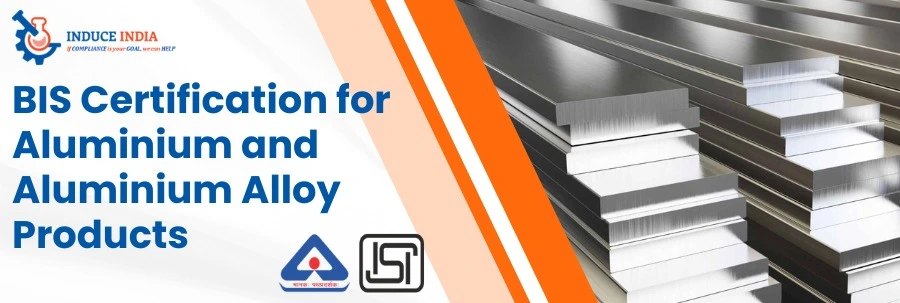A new QCO (Quality Control Order) has been notified by MINISTRY OF COMMERCE AND INDUSTRY (Department for Promotion of Industry and Internal Trade) to make BIS Certification mandatory for Aluminium and Aluminium Alloy Products.
Date of Implementation for Mandatory BIS Certification
- This Order may be called the Aluminium and Aluminium Alloy Products (Quality Control) Order, 2023.
- As mentioned in notified QCO, this order shall come into force on the expiry of 6 months from the date of publication of this notification in official gazette.
Compulsory use of Standard Marks for Aluminium and Aluminium Alloy Products
After the completion of six months, BIS Certification will be mandatory for all the manufacturers of Aluminium and Aluminium Alloy Products. So, the manufacturers from India or overseas must have BIS Certification to adhere to ISI Mark on the product as per their Indian Standards. Without BIS Certification manufacturers of Aluminium and Aluminium Alloy are not allowed to sale their product in the Indian market.
As mentioned in this QCO, if any person who contravenes the provisions of this order shall be punishable under the provisions of the Bureau of Indian Standards Act, 2016.
Products that are covered under this QCO
Aluminium alloy tubes for irrigation purposes – welded tubes- 7092 (Part 1):1992
Aluminium alloy tube for irrigation purposes – extruded tube- 7092 (Part 2):1987
EC Grade Aluminium Rod produced by Continuous Casting and Rolling- 5484:1997
Wrought aluminium and aluminium alloy bars, rods and sections (For General Engineering Purposes)- 733:1983
Wrought aluminium and aluminium alloys, forging stock and forgings for general engineering purposes- 734:1975
Wrought aluminium and aluminium alloy plate for general engineering purposes- 736:1986
Wrought aluminium and aluminium alloy sheet and strip for general engineering purposes- 737:2008
Wrought aluminium and aluminium alloy wire for general engineering purposes- 739:1992
Wrought aluminium and aluminium alloy rivet stock for general engineering purposes- 740:1977
Wrought aluminium and aluminium alloy bars, rods, tubes, sections, plates and sheets for electrical applications- 5082:1998
Aluminium and aluminium alloy foil for pharmaceutical packaging- 16011:2012
Aluminium composite panel- 17682:2021
Wrought aluminium and aluminium alloys-Extruded round tube and hollow sections for general engineering purposes- 1285:2002
Wrought Aluminium Wire for Electrical Purposes- 2067:1975
Wrought aluminium and aluminium alloys for manufacture of utensils- 21:1992
Corrugated Aluminium Sheet- 1254:2007
Aluminium alloy forging stock and forgings (Alloy 24345) for aerospace applications- 7902:2001
This QCO is applied for Aluminium and Aluminium Alloy Products specified in the table:
| Goods or articles | Indian Standard | Title of Indian Standard |
| (1) | (2) | (3) |
| Aluminium and Aluminium Alloy Products | 7092 (Part 1):1992 | Aluminium alloy tubes for irrigation purposes – welded tubes |
| 7092 (Part 2):1987 | Aluminium alloy tube for irrigation purposes – extruded tube | |
| 5484:1997 | EC Grade Aluminium Rod produced by Continuous Casting and Rolling | |
| 733:1983 | Wrought aluminium and aluminium alloy bars, rods and sections (For General Engineering Purposes) | |
| 734:1975 | Wrought aluminium and aluminium alloys, forging stock and forgings for general engineering purposes | |
| 736:1986 | Wrought aluminium and aluminium alloy plate for general engineering purposes | |
| 737:2008 | Wrought aluminium and aluminium alloy sheet and strip for general engineering purposes | |
| 739:1992 | Wrought aluminium and aluminium alloy wire for general engineering purposes | |
| 740:1977 | Wrought aluminium and aluminium alloy rivet stock for general engineering purposes | |
| 5082:1998 | Wrought aluminium and aluminium alloy bars, rods, tubes, sections, plates and sheets for electrical applications | |
| 16011:2012 | Aluminium and aluminium alloy foil for pharmaceutical packaging | |
| 17682:2021 | Aluminium composite panel | |
| 1285:2002 | Wrought aluminium and aluminium alloys-Extruded round tube and hollow sections for general engineering purposes | |
| 2067:1975 | Wrought Aluminium Wire for Electrical Purposes | |
| 21:1992 | Wrought aluminium and aluminium alloys for manufacture of utensils | |
| 1254:2007 | Corrugated Aluminium Sheet | |
| 7902:2001 | Aluminium alloy forging stock and forgings (Alloy 24345) for aerospace applications |
Download QCO here.
How to get BIS Certification?
If quality and safety standards are your priority and looking for BIS Certification to adhere ISI Mark on your products, as one of the best BIS Consultancies in India is Induce India will assist you step by step in obtaining your BIS Certification with ease as per the guidelines of Bureau of India Standards (BIS).
What is Process for BIS Certification for Aluminium and Aluminium Alloy Products?
The process for BIS Certification is different for both ISI Mark under Domestic Certification and ISI Mark under FMCS it includes the series of steps set by the Bureau of Indian Standards. Here is the process for ISI Mark Certification for Aluminium and Aluminium Alloy Products.
Process for BIS Certification under FMCS:
- Documentation before submission of application
Before submission of application, we identify the relevant Indian Standard code for your product after that we prepare the required documents which include product details and test reports.
- Scrutiny of application by BIS officials
In second step, BIS officials will review your application to check whether the information provided meets the BIS requirements as per product standards.
- Nomination of auditor for Audit by BIS
If the application is complete BIS will nominate an auditor (authorized representative of BIS) to conduct an audit of your manufacturing site.
- Audit of manufacturing premises by BIS auditor
The BIS auditor will visit your manufacturing facility to assess whether it complies with the relevant standards according to your product and the auditor will review your production processes, quality control measures, testing facilities, and other relevant aspects.
They may also inspect records and interview personnel to ensure compliance.
- Grant of BIS license to the manufacturer
If the audit is successful, Bureau of Indian Standards will issue BIS license.
Process for BIS Certification for Domestic:
- Documentation before submission of application
- Submission of application with requisite documents to BIS
- Scrutiny of application by BIS officials
- Nomination of auditor for Audit by BIS
- Audit of manufacturing premises by BIS auditor
- Sample draw for independent testing
- Sample testing in BIS approved laboratory
- Grant of BIS license to footwear manufacturer
Conclusion
Obtaining BIS certification for products is not only a mandatory step but also important to ensure the quality and safety standards of the products.
It’s often beneficial to consult with BIS Consultants, such as INDUCE INDIA, to navigate the complex certification process effectively.
These consultants can provide guidance, and assistance with documentation, and help you understand the specific requirements of the ISI certification process, ensuring that your application is complete and meets all necessary criteria. For more information feel free to contact us call at +91-7503304082 or email at [email protected]



